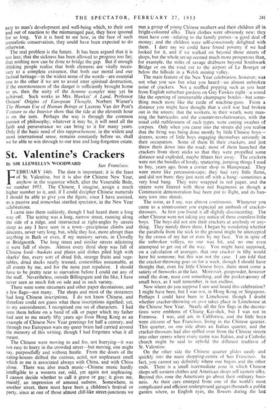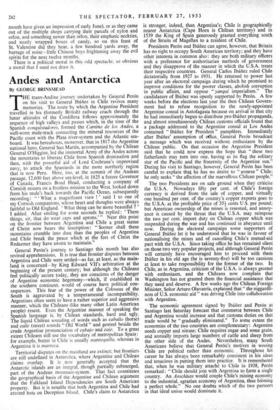St. Valentine's Crackers
By SIR IiLBWELLYN 'WOODWARD San Francisco.
FEBRUARY 14th. The date is important; it is the feast of St. Valentine, but it is also the Chinese New Year, anyhow in the sequence which, after the Venerable Bede, we number 1953. The Chinese, I imagine, assign a much higher number to it, and, if I could decipher Chinese numerals I should be able to give you the figure, since I have assisted, as a passive and somewhat startled spectator, in the New Year celebrations.
I came into them suddenly, though I had heard them a long way off. The setting was a long, narrow street, running along the side of a ridge, and intersected at right-angles by streets steep as any I have seen in a town—precipitous climbs and descents, never very long, but, while they last, more abrupt than anything in Bath or even, if my memory serves, in Clovelly or Bridgporth. The long street and similar streets adjoining it were full of shops. Almost every third shop was full of Chinese food—baskets and plates and dishes piled high with sharks' fins, every sort of dried fish, strange fruits and vege- tables, dried ducks neatly trussed, comestibles unnamable, at all events by me, and for the most part repulsive. I should have to be pretty near to starvation before I could eat any of the stuff. Nevertheless, outside Billingsgate and the like, I have never seen so much fish on sale and in such variety.
There were some streamers and other paper decorations, and a few flags—not many. The shops and most of the streamers had long Chinese inscriptions. I do not know Chinese, and therefore could not guess what these inscriptions signified; yet, to my astonishment, I recognised one set of characters. I had seen them before on a band-of silk or paper which my father had sent to me nearly fifty years ago from Hong Kong as an example of Chinese New Year greetings for half a century, and through two European wars my queer brain had carried around the memory of this writing, though I had forgotten what it all meant.
The Chinese were moving to and fro, not hurrying—it was not easy to hurry in the crowded street—but moving, one might say, purposefully and without hustle. From the doors of the eating-houses drifted the curious, acrid, not unpleasant smell which to me is associated always with China, and with China alone. There was also much music—Chinese music hardly intelligible to a western ear, odd, yet again not unpleasing. I cannot decide whether to call it grave or gay; it gives me, mainl9, an impression of amused sadness. Somewhere, in another street, there must have been a children's festival or party, since at one of those almost cliff-like street-junctions we met a group of young Chinese mothers and their children all in bright-coloured silks. Their clothes were obviously new: they must have cost—relating to the family purses—a gpod deal of money; and the children were self-consciously delighted with them. I dare say we could have found poverty if we had looked for it, and if we walked on beyond those streets of shops, but the whole set-up seemed much more prosperous than, for example, the miles of savage drabness beyond Southwark. Bridge or on the road out to the' airport of Le Bourget or below the hillside in a Welsh mining valley.
The main feature of the New Year celebration, however, was not what you saw but what you heard—an almost unbroken noise of crackers. Not a muffled popping such as you hear from English suburban gardens on Guy Fawkes night—a sound like the opening of innumerable champagne bottles—but some- thing much more like the rattle of machine-guns. From a distance you might have thought that a civil war had broken out in the streets: that the workers, in their wrath, were man- ning the barricades, and the counter-revolutionaries, with the usual cold ruthlessness of such types. were cutting swathes of corpses. Only when you came into the streets did you realise that the firing was being done mostly by little Chinese boys— dozens, scores of little boys engaging themselves seriously in their occupation. Some of them lit their crackers, and just threw them down into the road; most of them launched the crackers from short sticks so that they were propelled some distance and exploded, maybe fifteen feet away. The crackers were not the bundles of lovely, spattering, jumping things I used to buy, years ago, from a corner shop in Hampstead. They were more like percussion-caps; they had very little flame, and did not burn; they just went off with a bang—sometimes a very loud bang. They were wrapped in red paper, and the streets were littered with these red fragments as though a Communist demonstration had been put to flight, and its ban- ners torn into shreds.
The noise, as I say, was almost continuous. Whenever you came to a street-corner you expected an ambush of cracker- throwers. At first you found it all slightly disconcerting. The other Chinese were not taking any notice of these countless little boys. The boys did not aim their crackers at anybody or any- thing. They merely threw them. I began by wondering whether the parabola from the stick to the ground might be intercepted by the crown of my hat or even by my face. Yet in spite of the unbroken volleys, no one was hit, and no one even attempted to get out of the way. You might have supposed, on a calculation of averages, that one cracker in fifty would have hit someone; but this was not the case. I am told that the cracker-throwing goes on for a week, though I should have thought that, even for little Chinese boys, there must come a satiety of fireworks at the last. Moreover, gunpowder, however small the dose, must cost something, and the pocket-gioney of small boys, as I well remember, is not endless.
Now where do you suppose I saw and heard this celebration? I might have been, but I was not, in Hong Kong or Singapore. Perhaps I could have been in Limehouse, though 1 doubt whether cracker-throwing en gros takes place in Limehouse at the Chinese New Year. Nearly all the few flags in the decora- tions were emblems of Chiang Kai-shek, but I was not in Formosa. I was, and am, in California, and the little boys were citizens of San Francisco, living in the Chinese quarter. This quarter, on one side abuts an Italian quarter, and the cracker-throwers had also spilled over from the Chinese streets into other streets where every name was Italian, and a Catholic church might be said to uphold the different tradition of St. Valentine.
On the other side the Chinese quarter glides easily and quickly into the main shopping-centre of San Francisco. In fact, you cannot say definitely where one begins and the other ends. There is a small intermediate zone in which Chinese shops sell western clothes and American shops sell eastern silks. Beyond this zone the Americans go about their ordinary busi- ness. As their cars emerged from one of the world's most complicated and efficient underground garages (beneath a public garden where, to English eyes, the flowers during the last month have given an impression of early June), or as they came out of the multiple shops carrying their parcels of nylon and orlon, and something newer than orlon, their emphatic neckties, and neatly wrapped boxes of candy, so on this feast of St. Valentine did they hear, a few hundred yards away, the barrage of noise—little Chinese boys frightening away the evil spirits for the next twelve months.
There is a political moral in this odd spectacle; so obvious a moral that I need not draw it.



































 Previous page
Previous page